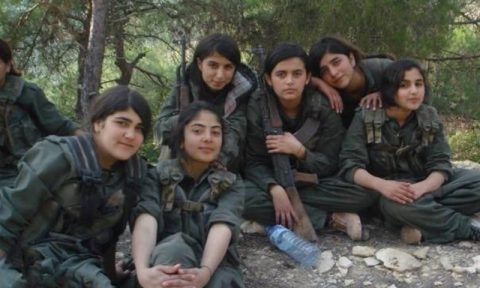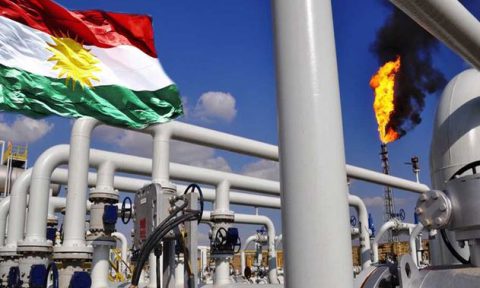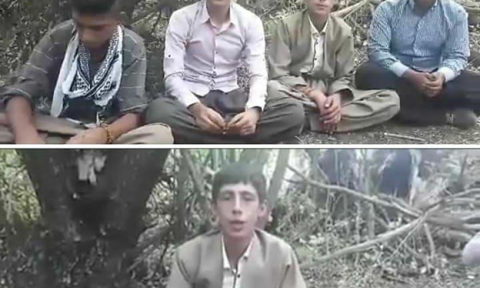In this article, I will present a few simple, clear reasons WHY a kurdish enclave in North-Syria should be unwanted, as PYD/SDF claims to turn a big part of the country into a confederal state, and attempts to annex Syrian land are illegitimate, undemocratic, and could lead to great instability.
You should know, these are not the only reasons to be found against the Kurdish enclave, but are just a sum-up of the first things that come to mind and easy to comprehend for a reader without a further political background.
1/ Kurds are not a majority in the areas they are trying to annex
For example, let’s take a look at the al-Hasakah Governate, which the PYD and their military wing have declared a federal kurdish state. Al Hasakah as a city, is a mosaic of Assyrian christians, Armenians, Turkmens, Kurds and Bedouin Arabs. Of the 1.5 million population of Al Hasakah only 40% are ethnically Kurdish. Other parts of this governate contain even less ethnical kurds. Letting a small area with a wide array of ethnic groups be ruled by a specific ethnic minority is a recipe for oppression, even if they campaign for a multicultural society, we should not forget this party is affiliated to the PKK which has led a seperatist battle against Turkey for 40 years.
The Kurdish population of Al Hasakah has also been heavily inflated by illegal kurdish immigration from Turkey. Kurdish immigration to Syria began in the 1920’s and occurred in several waves after multiple failed kurdish uprisings against Turkey, and continued throughout the century.
Kurdish illegal immigrants who mostly reside in north Syria, and who could not prove their residence in Syria before 1945, complain of oppression when they were not granted the rights of Syrian citizens. Syrian law dictates that only a blood born Syrian whose paternal lineage is Syrian have a right to Syrian citizenship. No refugee whether Somali, Iraqi or Palestinian has been granted Syrian citizenship no matter how long
their stay. In spite of this, in 2011 the Syrian president granted Syrian citizenship to 150,000 Kurds. This has not stopped the YPG from using the fact illegal kurdish immigrants were not granted citizen rights in the past as a rationale to oppose the legitimate Syrian government.
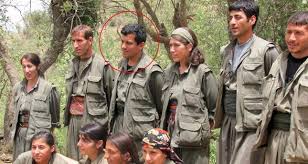
۲/ Other ethnical minorities and minority of Kurds cannot live with Ocalan’s ideology
Everywhere PYD/SDF goes, they leave radical ideology and worshipping of a totalitarian leader behind. As these parties are affiliated to the Kurdistan’s Worker Party (PKK), they impose their radical ideology on the people in the areas they occupy. In all schools, offices and even hospitals, posters of the imprisoned PKK leader are present. Every civilian that wants to work in a public organisation receives ideological training.
It is notable that not all Kurds are in favor of this ideology. A large group of Kurds prefer the Syrian legitimate government and the old system, others are in favor of ENKS or PDKS, which are affiliated to the Iraqi Kurdish parties. Having to live with Ocalan’s extreme ideology is undoable for the Arab majority and Christian minorities, who have lived and practised their own cultures for centuries. The Arabs have had a tribal system since history, you can not expect the tribal leaders to adapt to this ideology easily, as it refuses tribalism.
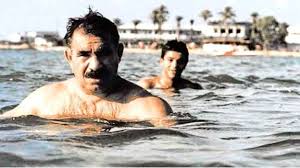
۳/ Threat of ethnic cleansing
Since the Kurdish population is not a majority in the areas PYD/SDF are trying to annex, the past few years have revealed that PYD/SDF are not beyond ethnic cleansing of non-Kurdish minorities in an attempt to achieve a demographic shift. The main threat to ethno-centric territorial claims over the area are the other large minorities, the Arabs and the Assyrian christians.
In a 38-page report, “‘We Had Nowhere Else to Go’: Forced Displacement and Demolition in Northern Syria,” Amnesty International catalogues allegations of forced evictions of Arabs and Turkmens and the destruction of their homes and property. “In some cases, entire villages have been demolished, apparently in retaliation for the
perceived support of their Arab or Turkmen residents for the group that calls itself the Islamic State,” Amnesty International noted. Villagers said they were ordered to leave at gunpoint, their livestock shot at. The watchdog used satellite imagery and video footage to verify the claims.
In the Arab village of Husseiniya near Tell Hamees, for instance, only a single house was left standing. Residents said the YPG had razed their homes in February. In Raneen, near Tell Abyad, locals said YPG forces had threatened to shoot them if they failed to leave. One person said, “They told us we had to leave or they would tell the US coalition that we were terrorists and their planes would hit us and our families. In Raneen, where some people were with IS, there were lots of problems but we had nothing to do with anything.” Alleged YPG threats of calling in US airstrikes against villagers if they didn’t leave are repeated throughout the report.
4/ Resources should be shared with ALL Syrians
If we look carefully at Syria’s resources, we can see that the areas SDF occupies, are among the wealthiest of the country. 43% of all wheat before the war in Syria was produced in the al-Hasakah governate.
As you can see on the map below, the largest part of Syria’s oil reserves are located in the areas SDF occupies. The oil fields are concentrated in the province of Deir az-Zour, in eastern Syria, near the Iraqi border, and al-Hasakah in the north-east.
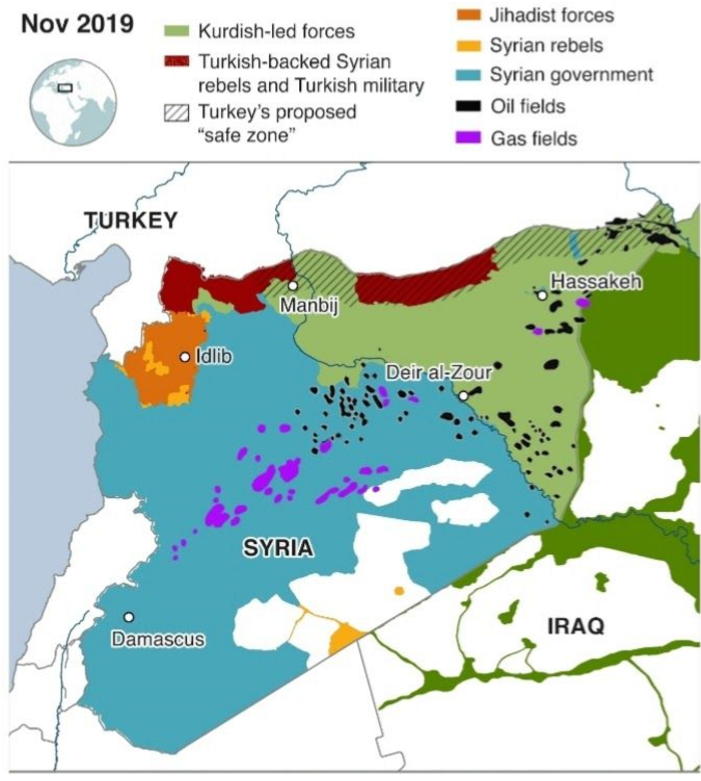
Breaking up the country would mean unequally dividing the country’s agricultural and oil resources. While headlines abound about Syria’s starving population, there is little talk of how federalising Syria could entrench this starvation into practise for the generations to come. Instead, promoters of Federalism talk about how the resources shared by 23 million people will be given to 1.5 million people.
It is questionable how PYD – which started operating for the Kurds only – has evolved its politics into a multi-ethnic plan over the last few years. It probably has to do with annexing areas such as Deir az-Zour, which has a large Arab majority and houses only a very small number of Kurds. But hey, the oil is there.
5/ Kurdish region in Syria causes regional instability
The existence of a kurdish region in North-East Syria is a threat to global security and a cause of regional instability.
Since the majority of Syria’s population and Syria’s government oppose Kurdish annexation claims, PYD will not be able to achieve federalism through legal means. The only way the PYD and YPG can achieve federalism is through brute force. This brute force may backed by the US air force and special forces invasion which contradicts international law.
There is a natural tendency for governments, news media, and analysts to focus on today’s crisis and the most familiar threat. In the case of Syria, the crisis is Turkey’s invasion of the Kurdish enclave, and the most familiar threat is the potential resurgence of ISIS – a resurgence that is already taking place to some extent in North-East Syria and Iraq.
There is little coverage of the longer-term prospects for instability, extremism and terrorism, and civil conflict. And, when such coverage does take place, it generally focuses on some tangible and possibly superficial outcome, such as a ceasefire or peace negotiation that may or may not achieve even a temporary end to the fighting and improved level of stability.
The grim reality, however, is that Syria is all too typical of what can only be called “failed state wars.” Tragic as the legacy of the current fighting may be for the Kurds, there is virtually no chance that Syria will emerge as a peaceful or stable federal state over the coming years, or that it will not be a source of tension and conflict in the region. Splitting up the country will NOT lead to stability in the region. Neither does the rope-pulling between different international powers easen the Syrian people’s suffering, nor will it lead to the SDF’s success on the long term.
Many international powers are now mongering in Syria. US backs the kurdish-led SDF, Russia patrols with the Turks trying to contain a ceasefire in North-Syria, the legitimate government of Syria fights the Turkish-backed rebels, Iran-backed group try to prevent an ISIS resurgence, ISIS at the same time abuses this military melting pot as a chance to resurge.
Though Israel does not actively back SDF, it is certainly one of the most dangerous parties mongering in the Syrian civil war. It wants to overthrow the Syrian legitimate government and hopes for the Kurds to remain, as a future rival to the Islamic Republic of Iran. They hope that a strong Sunni block in the region will diminish Iran’s access to Syria and the Lebanese resistance against Israeli invasion.
Israel is an extension of US influence and hegemony in the region. Strengthening Israel in the region will also strengthen US influence over the region, when the US influence increases, UAE, Qatar and Saudi Arabia gain in influence as well, while shrinking Russian influence at the same time. It might tip the balance of power in the world with all possible horrible results.
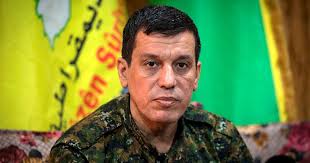
۶/ Seperatist kurdish movements profit from its existence
The PYD/SDF are affiliated to the Kurdistan Worker’s Party (PKK), which is globally recognized as a terrorist organisation. The PKK has led a seperatist guerilla war in South-East Turkey for forty years, which has caused many thousands of casualties there.
The PKK has different branches in each country that has a Kurdish ethnic minority. PCDK is the name of the Iraqi Kurdish branch of the terrorist organisation, founded in 2002. The party contested the 2005and 2009 Kurdistan Region parliamentary elections but failed to win any seats. As the party only caused unrest, the Kurdistan Democratic Party (KDP) even closed its headquarters and the party was banned from the Kurdistan Regional Government (KRG), but it continued to operate. However, PCDK was never as successful as its siblings.
PJAK is the Iranian branch of the PKK, it started an armed conflict agai st the Iranian state, which began in 2004 and largely ended in 2011. The group was carrying out attacks in the Kurdistan Province of Iran and other Kurdish-inhabited areas. The conflict has caused many casualties on both sides.
If the PKK will be legally given the right to remain and rule in North-East Syria, it is likely that the armed conflict in Turkey and Iran will continue and cause more casualties.
7/ PYD/SDF is not as ‘democratic’ as they propagate
Though the Kurds have introduced a plan for democratic confederalism which at first sight looms like a great plan for equality, democracy and peace in the region, it is not at all what it seems.
Big concepts such as gender equality, secularism, revolution, humanism and ethics are what is cited again and again, in such a way, to smooth over the cracks of the group’s terroristic threats to the region. And supporters of this group would be right, I would say again, unless there were not a lot of reports on how the group violated human rights, and still does, by carrying out attacks on opposing Kurdish groups, in addition to non-Kurdish populations in northern Syria – namely Arabs and Turkmens, as I have mentioned earlier in the “ethnic cleansing” part of my article.
Even reports by the Kurdish National Council (KNC), an assembly formed by political parties and civil society organizations defending the rights of Kurds in Syria and Iraq, on the criminal profile of the PYD/YPG serve more than enough to see how anti-democratic and non-humanitarian the group is especially against Kurds.
Kidnapping Kurdish dissidents is a habit for the PYD, which last year on Feb. 9 abducted Fadi Marie of the Future Movement and a member of the KNC’s secretariat while he was traveling on the Qamishli-Ma’abada road in northeastern Syria. The group’s official site shows that only between March 14 and March 16, 2017, over 20 offices ‘have been torched or demolished, and subsequently were sealed up by PYD security forces.’
The group’s leader, İbrahim Biro, was expelled from northern Syria and threatened by the group to be ‘cut into pieces’ if he ever returns. Does anyone think such actions of the PYD/YPG correspond to ‘progressive democracy?’








